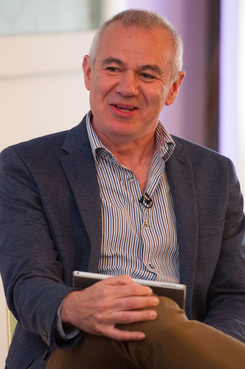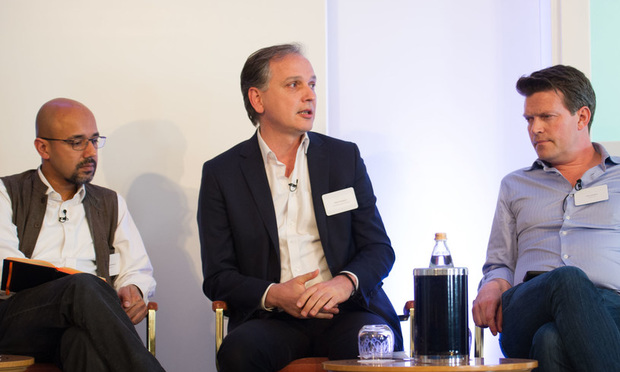'The client is a terrific agent of change' - how law firms are setting themselves up to innovate
Partners and innovation leaders from firms including Freshfields and Osborne Clarke explain how they are driving change
September 26, 2017 at 04:26 AM
7 minute read
At Legal Week's Strategic Technology Forum, a panel discussion, moderated by Kingsmead Square executive director Chris Bull, explored how law firms are attempting to foster a culture in which innovation is actively encouraged
Chris Bull, executive director, Kingsmead Square: "We've got four firms here that are among the most innovative in the market and we've got four people who are in innovation leadership roles within their firm, but not in the IT function. Can you all say a little bit about your role and how you engage with innovation in your firm?"
Dan Wright, partner, service innovation, Osborne Clarke: "There is an opportunity to use new and emerging technologies to help ensure we are offering new products and services that clients need and want to buy. Providing new ideas presents a change management challenge, but by involving the client early in the change process, that can become easier.
"Using my background as a transactional partner, I've maintained that client-first approach, just with a different focus. I work with clients to understand their challenges and discuss what we could do differently, and what technology we could use, to help achieve the solutions they want. I can then take back to the firm a client suggestion or request, which makes it much easier to get the change processes started. The client is a terrific agent of change."
Clients want to be involved, rather than just be sold an idea – they want to be part of building it
Siddhartha Mankad, partner, COO, Kemp Little (pictured above, left): "For me the emphasis was always to look at it from the client's perspective, from a service perspective and from an effectiveness perspective. We now have non-lawyers as a named person on key client programmes where the clients get in touch with the non-lawyers directly; it's not just stepping in where you have an issue, it's actually being part of the engagement team on a regular basis and that makes a lot of difference because the conversation is fundamentally different to that which many of the lawyers have."
Milos Kresojevic, innovation architect, Freshfields Bruckhaus Deringer (pictured above, centre): "For us, innovation is very specifically defined, it's not just next generation – which kind of belongs to current operations – but the technologies and the products that can disrupt the way we do business and provide services to our clients. So that means addressing challenges around how innovation impacts our clients and every single department in our firm because we are trying to do things differently."
 Alex Hamilton, CEO, Radiant Law (pictured above, right): "I have a traditional lawyer background and it was pretty clear to me the way law gets delivered is pretty ugly, so I thought it was easier to set up a law firm than change one. We set up Radiant in 2011, and my job as CEO is to try and create an organisation where innovation is embedded. We don't have partners, we don't have timesheets, we're trying to create an organisation where we're not trying to fix a bunch of lawyers and their behaviours."
Alex Hamilton, CEO, Radiant Law (pictured above, right): "I have a traditional lawyer background and it was pretty clear to me the way law gets delivered is pretty ugly, so I thought it was easier to set up a law firm than change one. We set up Radiant in 2011, and my job as CEO is to try and create an organisation where innovation is embedded. We don't have partners, we don't have timesheets, we're trying to create an organisation where we're not trying to fix a bunch of lawyers and their behaviours."
Chris Bull (pictured right): "What's actually going on in your firms today – can you tell us some of the things that you're doing?"
Dan Wright: "Our new solutions team is working closely with IT in bridging that gap between IT and the business. Increasingly, we work with the notion that the IT team delivers a robust suite of legal service delivery applications that are intuitive and configurable by the non-IT specialists in my team. The IT team gives us a very technical toolkit, capable of being leveraged for clients' benefit, and sets us the challenge to apply it in the most useful way possible for clients. We then talk with our clients' legal and other operational teams, and work out how to deliver what they all need.
"Clients want to be involved too, rather than just be sold an idea – they want to be part of building it. So it's bringing bits of our own business closer together, and working in innovative ways with clients, to create new solutions. All using new technology, but as the means of delivery of the best underlying process and product."
Siddhartha Mankad: "We're in the midst of building something that one of our lawyers designed himself in response to clients coming back to us with very similar questions over and over again. We took a lot of that information – you could call it a knowhow system – and set it up so that the legal team could use it themselves, and it's proving popular enough that we're getting it coded up properly and turned into a product.
"We are trying to embrace 'shadow IT' and let the lawyers who are interested in doing this and have the skills to do it to work with IT. They have their own budget, they have complete control over what they want to do – the only condition they have is they can't just go out and start solving their own personal pet project; they need to be solving something that other people have an issue with, and once they start they have to finish it, and coordinate with IT just enough to ensure we aren't duplicating effort."
Associates can get seconded to our team for three to six months to actually lead a project
Milos Kresojevic: "We are creating a large network of associates within each practice group who are ambassadors for and also part of the innovation team, so we have really embedded innovation across the practice groups and the firm. They can initiate the projects themselves, they can get seconded to our team for three to six months to actually lead a project, and they also collect and aggregate ideas from the practice groups and geographies that they are in and throw it at us."
Chris Bull: "So it's fast-moving and agile but not complete anarchy – you're getting all these people involved with all these ideas, but all of you have said there's got to be some systemic management or coordination of this, and it's got to have an end purpose. Alex, what are the key components of product innovation at Radiant?"
Alex Hamilton: "If you're going to start with a blank sheet of paper you might as well do things differently. So the first key thing was having no timesheets, and the the second is that we reinvest – we don't take money out of the firm, we just keep putting it back in and building stuff for the future. We've also distributed decision making so anyone in the firm can start a project, they don't need permission, and we don't even hand work out."
Chris Bull: "How fundamental is technology to your business and to how you see innovation?"
Alex Hamilton: "It's pretty core. The law tech market has changed over the last five years but too much of the market has traditionally been resprayed Microsoft products, so we started by going to cloud-based products outside of law – because they tend to be more platforms than specific apps, which empower people to play with them – and then we fill in the gaps."
- Chris Bull and Milos Kresojevic will be speaking at the LegalWeek CONNECT event this November, which will focus on talent, technology and new thinking in the world of law. Click here to register for the event.
NOT FOR REPRINT
© 2025 ALM Global, LLC, All Rights Reserved. Request academic re-use from www.copyright.com. All other uses, submit a request to [email protected]. For more information visit Asset & Logo Licensing.
You Might Like
View All
Buzzwords, Bad Wine & Broken Social Contract: The Rise of Boring Legal Conferences

'We Shouldn't Expect this From Law Firms': Clients Discuss Workload in Aftermath of Pinsents Tragedy
3 minute read
Smiling Too Much? Why Some Lawyers' Partnership Ambitions 'Crash and Burn'

Legal Sector Must Learn to 'Fail Quickly' on Technology, Partners Say
Trending Stories
- 1Silk Road Founder Ross Ulbricht Has New York Sentence Pardoned by Trump
- 2Settlement Allows Spouses of U.S. Citizens to Reopen Removal Proceedings
- 3CFPB Resolves Flurry of Enforcement Actions in Biden's Final Week
- 4Judge Orders SoCal Edison to Preserve Evidence Relating to Los Angeles Wildfires
- 5Legal Community Luminaries Honored at New York State Bar Association’s Annual Meeting
Who Got The Work
J. Brugh Lower of Gibbons has entered an appearance for industrial equipment supplier Devco Corporation in a pending trademark infringement lawsuit. The suit, accusing the defendant of selling knock-off Graco products, was filed Dec. 18 in New Jersey District Court by Rivkin Radler on behalf of Graco Inc. and Graco Minnesota. The case, assigned to U.S. District Judge Zahid N. Quraishi, is 3:24-cv-11294, Graco Inc. et al v. Devco Corporation.
Who Got The Work
Rebecca Maller-Stein and Kent A. Yalowitz of Arnold & Porter Kaye Scholer have entered their appearances for Hanaco Venture Capital and its executives, Lior Prosor and David Frankel, in a pending securities lawsuit. The action, filed on Dec. 24 in New York Southern District Court by Zell, Aron & Co. on behalf of Goldeneye Advisors, accuses the defendants of negligently and fraudulently managing the plaintiff's $1 million investment. The case, assigned to U.S. District Judge Vernon S. Broderick, is 1:24-cv-09918, Goldeneye Advisors, LLC v. Hanaco Venture Capital, Ltd. et al.
Who Got The Work
Attorneys from A&O Shearman has stepped in as defense counsel for Toronto-Dominion Bank and other defendants in a pending securities class action. The suit, filed Dec. 11 in New York Southern District Court by Bleichmar Fonti & Auld, accuses the defendants of concealing the bank's 'pervasive' deficiencies in regards to its compliance with the Bank Secrecy Act and the quality of its anti-money laundering controls. The case, assigned to U.S. District Judge Arun Subramanian, is 1:24-cv-09445, Gonzalez v. The Toronto-Dominion Bank et al.
Who Got The Work
Crown Castle International, a Pennsylvania company providing shared communications infrastructure, has turned to Luke D. Wolf of Gordon Rees Scully Mansukhani to fend off a pending breach-of-contract lawsuit. The court action, filed Nov. 25 in Michigan Eastern District Court by Hooper Hathaway PC on behalf of The Town Residences LLC, accuses Crown Castle of failing to transfer approximately $30,000 in utility payments from T-Mobile in breach of a roof-top lease and assignment agreement. The case, assigned to U.S. District Judge Susan K. Declercq, is 2:24-cv-13131, The Town Residences LLC v. T-Mobile US, Inc. et al.
Who Got The Work
Wilfred P. Coronato and Daniel M. Schwartz of McCarter & English have stepped in as defense counsel to Electrolux Home Products Inc. in a pending product liability lawsuit. The court action, filed Nov. 26 in New York Eastern District Court by Poulos Lopiccolo PC and Nagel Rice LLP on behalf of David Stern, alleges that the defendant's refrigerators’ drawers and shelving repeatedly break and fall apart within months after purchase. The case, assigned to U.S. District Judge Joan M. Azrack, is 2:24-cv-08204, Stern v. Electrolux Home Products, Inc.
Featured Firms
Law Offices of Gary Martin Hays & Associates, P.C.
(470) 294-1674
Law Offices of Mark E. Salomone
(857) 444-6468
Smith & Hassler
(713) 739-1250









